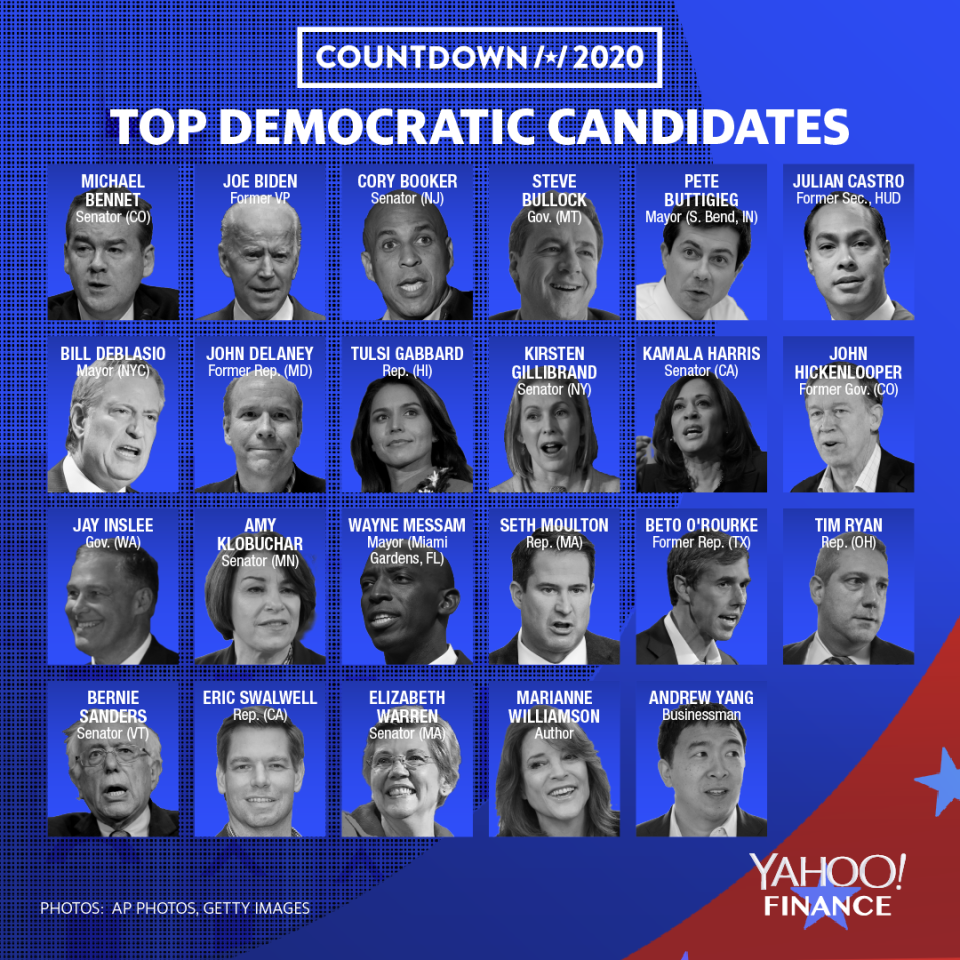Here’s why the public option keeps coming up with presidential candidates
Early in the 2020 election campaign, a Democratic conversation about health care usually meant one thing: a conversation about “Medicare for all.” The plan was championed by Sen. Bernie Sanders and would replace private insurance plans. Some voiced skepticism but the bill was co-sponsored by nearly every presidential candidate with a seat in Congress.
More recently – in a series of "Meet the Candidate" interviews on Yahoo Finance –another health care buzzword has been heard just as often: the public option.
"I think what we do need is a public option," former Colorado Gov. John Hickenlooper told Yahoo Finance’s Rick Newman in an interview. Sen. Michael Bennet added, “I think it's a lot better idea to have a public option, which finishes the work that we're started with the Affordable Care Act.”
From Massachusetts Congressman Seth Moulton: “My vision is the American vision of a competitive market, where private health care plans compete against public options,” while Rep. Tim Ryan of Ohio said: “we need to have some public option around affordable, accessible, quality health care.”
Front-runner Joe Biden also brought it up during his first rally as a presidential candidate. “You all should have a choice to be able to buy into a public option plan for Medicare. Your choice," he said in Pittsburgh in April.
Generally, a public option would let more workers choose a government-run insurance plan, like Medicare or Medicaid, instead of a private plan.
In 2009, the Obama administration and Congressional Democrats considered a public option to compete with private insurance companies, but the idea was eventually scrapped amid opposition from Republicans and some moderate Democrats. Now, these moderate 2020 Democrats are using the idea to shift the conversation away from Medicare for All.
Shifting stances on Medicare for all
Neera Tanden has been a leading Democratic voice on health care for years. “I would note that in some ways the conversation has moved in a more moderate direction over the last year,” said Tanden, who served as senior adviser at the U.S. Department of Health and Human Services and is now president of the Center for American Progress.
Early in the race, “all the prominent people had endorsed Medicare for all and most of them were senators and they'd all endorsed that,” Tanden said. “Now, many of those candidates – Sen. Warren, Sen. Booker – have said that they support multiple plans,” she said, adding that now “you have new candidates coming into the mix who don't support single-payer.”

For Tanden, whose group has its own plan to open Medicare to people who don’t have health care access through their jobs, the debate is a sign of a primary process that is working. “I expect there will be active debate on these topics,” she said. “And I think that's going to be healthy. And whoever emerges, their plan will be battle-tested.”
It remains an open question how much openness there is among Democratic primary voters for a debate that includes moderate plans. John Delaney may have questions on this front. He touted his moderate health care plan during his Meet the Candidate interview but was then booed when he criticized Medicare for all in front of a crowd of California Democrats. Rep. Alexandria Ocasio-Cortez later tweeted it was time for Mr. Delaney to “sashay away.”
How would a public option work?
And there’s some debate on what the public option means in 2019. Michael Bennet and John Hickenlooper advocate a public option that allows some younger Americans to “buy their way into Medicare,” in Hickenlooper’s words. Bennet’s plan “would be administered by Medicare. I think it would be the easiest way to provide a public option.”

Others are more skeptical of expanding Medicare access. Moulton noted, “I think that everybody should have a public option, perhaps like Medicare, although I think we can do better than a plan that was founded in 1963.”
Tim Ryan asked: “How do we start building this other system that people can get into?”
Another area of distinction is whether a public option will eventually lead to Medicare for all. Hickenlooper said that his plan will ”have an evolution of people into a single payer system,” while Bennet notes that people have plans through their work and “many of those people like their insurance and don't want to give it up. They're going to fight tooth and nail to keep it.”
In the end, Democrats on all sides hope that this debate ends with a workable plan instead of acrimony. Tanden has a reminder looking back at the 2008 election: “My view of why [Obamacare] happened is because there was a very rich policy debate on that during the primary and into the general,” she said.
Ben Werschkul is a producer at Yahoo Finance based in Washington, DC.
Read more:
Read more from Meet the Candidate
Michael Bennet: Money spent on tax cuts and wars 'might as well have [been] lit on fire'
Michael Bennet: 'It's not clear to me' Trump has the authority on tariffs
2020 Democrats have a lot of ideas for Walmart
Read the latest financial and business news from Yahoo Finance
Follow Yahoo Finance on Twitter, Facebook, Instagram, Flipboard, LinkedIn, YouTube, and reddit.
